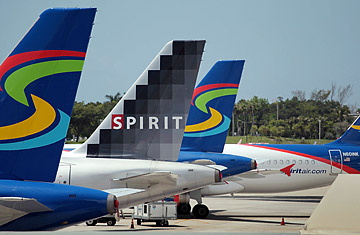
Spirit Airlines planes at Fort Lauderdale International Airport in Florida during the pilot strike
Good news for stranded travelers: the Spirit Airlines pilots strike, which left many Florida vacationers stranded, was called off at 8:28 p.m. Wednesday evening, as a union recorded voice message said, "We held the line, well done," and instructed pilots to return to work. Though the details of the tentative settlement are still unknown, captain Sean Creed, leader of the Spirit unit of the Air Line Pilots Association (ALPA), released a statement noting "increases in pay and retirement benefits" were among the gains achieved in the negotiations. Spirit flights were expected to resume Friday.
While the strike is over, the airline industry's labor problems are not since other unions will likely seek to capitalize on any gains achieved by Spirit's pilots. "Every other pilot group in the country is frustrated with their inability to get a new contract," says Thomas Kochan, an industrial-relations professor at MIT's Sloan School of Management and co-author of Up in the Air: How Airlines Can Improve Their Performance by Engaging Their Employees. "If they got a substantial increase, others are going to be bolstered to push harder in negotiations themselves."
As union members see it, there is plenty of lost ground to make up. The airline industry has shed up 100,000 jobs and cut $15 billion in wages and benefits over the past 10 years, according to Kochan, and members are understandably unhappy as they watch the industry's business begin to improve without any payoff to them. The International Air Transport Association declared global traffic is back to prerecession levels and recently forecast $545 billion in revenues for 2010, up almost 13% from last year's figure.
American Airlines (AA), currently the second largest carrier in the U.S., may be in the trickiest spot since it is currently in negotiations with its pilots. "We congratulate the Spirit pilots on reaching a tentative agreement," said Gregg Overman, spokesman for the Allied Pilots Association (APA), which represents over 10,000 AA pilots, some of whom walked the Spirit picket line in solidarity, "and [we] look forward to learning about the agreement's specifics."
The APA and American have been at the table 82 times with the National Mediation Board (NMB) over the past two years, and they've been negotiating over a new contract for nearly four years. "My hair's turned grey since we started talking," says Overman. "We think that length of time is ridiculous." American's management points out that they don't set the schedule, the NMB does, and with only a handful of federal mediators available, and complex scheduling issues, cases can take a long time to hammer out.
Overman feels AA pilots, like those at other carriers, made deep sacrifices for the industry. "We gave up a great deal to help AA avoid bankruptcy seven years ago, and now we've watched a basic transfer of wealth to managers," he says. "It hasn't created a good atmosphere." The APA says that AA's top-tier managers have seen over $330 million in stock grants since 2006 and salary increases of 150% on average while pilots' pay rates are what they were in 1993. "It was supposed to be shared sacrifice, shared reward," says Overman.
American says its management team's total compensation is targeted at the median of the market for comparable positions within and outside the airline industry. American Airlines spokeswoman Missy Latham adds that "the average AA pilot makes approximately $140,000 a year" and that the "average American pilot retiring today walks away with about $2 million in cash."
Even airlines that haven't seen job cuts or furloughs, like budget carrier AirTran, which has been profitable in nine of the past 10 years, are operating without an approved contract.
Part of the reason negotiations are dragging on, Kochan believes, is the enormous gap between expectations and reality. "Pilots want to go back to 2000-level wages, when salaries peaked," he says, "but that's not necessarily what companies can afford." But that's not the only issue. When CEOs get pay rises "that takes away from the argument that the employees can't be paid," opines Jody Hoffer Gittell, head of Brandeis University's MBA program and another co-author of Up in the Air.
To break the logjams, Kochan urges Secretary of Transportation Ray LaHood to show more leadership. "[LaHood] set up the Aviation Future Panel," says Kochan about the 20-person committee set up last month. "This issue should be his top priority." To get both sides to agree, most observers believe, they've got to think long-term. "We've got to get away from the boom-and-bust model," says Kochan. "Total compensation for workers, middle management and top management should be tied to revenue and general economic conditions."
While pressures may mount this summer, unhappy pilots won't necessarily translate into more strikes. When both sides sit with the National Mediation Board the rules are that they have to get a release from the board to take "direct action," that is, go out on strike. "Spirit is a small airline, so the mediation board gave them the O.K.," says Kochan, "but the board is unlikely to release an airline like American for a strike." The board works well, Gittell agrees. "We don't have a lot of strikes."
Let's hope they're right.
